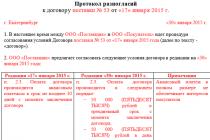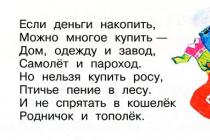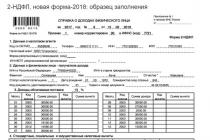It's been ten years since the order of the President Russian Federation V. Putin No. 306 dated March 11, 2003 on the abolition of the Federal Tax Police Service of Russia. AND professional holiday- Day of the tax police on March 18 remained in the calendar.
On this occasion, I propose to recall the history of the creation of one of the short-lived special services of the new Russia.
On March 18, 1992, in accordance with the Decree of the President of the Russian Federation No. 262, the Main Department of Tax Investigations under the State Tax Service of the Russian Federation (GUNR) was established with a staff of 12,000 people. The department was headed by KGB General V. B. Yampolsky.
In 1993, the Law "On Federal Tax Police Bodies" was adopted, in accordance with which the Tax Police Department of the Russian Federation was established as the assignee of the Main Directorate of Tax Investigations under the State Tax Service of the Russian Federation.
The Decree of the Council of Ministers of October 11, 1993 approved the Regulations on the Tax Police Department of the Russian Federation and the list of positions for which special ranks are assigned to tax police officers. The staffing of the federal bodies of the tax police has been established: as of January 1, 1994 - 21,500 units; as of January 1, 1995 - 43,800 units. S. N. Almazov was appointed Director of the Department.
The headcount of the central office of the Tax Police Department of the Russian Federation was set at 500 units (excluding building maintenance personnel). The structural scheme of the Tax Police Department of the Russian Federation was approved.
In December 1995, the DNP acquired a new status and name - federal Service tax police of the Russian Federation. At the same time, the country's youngest law enforcement agency was given the right to create its own investigative apparatus.
By the Decree of the Government of the Russian Federation of June 17, 1998, the FSNP is allowed to have eight deputy directors, including the first two, and a collegium of 17 people.
On March 22, 1999, by decree of the President of the Russian Federation, former policeman Vyacheslav Soltaganov was appointed director of the Federal Tax Police Service, and Sergey Almazov was dismissed. From that moment, the first personnel purge in its history began in the FSNP - the replacement former employees state security on employees of the Ministry of Internal Affairs.
On May 12, 1999, by the Decree of the President of the Russian Federation, it was established that the FSNP has 7 deputy directors, incl. the first two, the State Secretary-Deputy and the Deputy Head of the FSN in Moscow.
On September 25, 1999, a new Regulation on the Federal Tax Service of Russia was approved. At the same time, the staffing of the federal tax police was set at 53,300 units.
January 2, 2000 President of the Russian Federation V.V. Putin signed a decree "On the introduction of amendments and additions to tax code", according to which the tax police received the right to independently conduct tax audits, they are also allowed access to tax secrecy. In addition, amendments were adopted to the law "On operational-search activity", allowing employees of the Federal Tax Service to have their own opportunities for covert removal of information.
March 18 - Tax Police Day. Established by the Decree of the Acting President of the Russian Federation V.V. Putin dated March 16, 2000 in recognition of the importance of the federal tax police in ensuring economic security RF.
The Tax Police Academy and a number of other educational institutions were created at the Federal Tax Service. The newspaper "Tax police" was published. On television, director Apasyan created a series about the tax police "Maroseyka, 12". Books of the detective genre about the tax police were published; among them were books by the writer Nikolai Ivanov, an employee of the department (the dilogy "Department of the Tax Police" and others).
The tax police became the only law enforcement agency that reimbursed the costs of its maintenance, and most importantly, returned huge amounts of unpaid taxes to the state treasury. For example, in 2001, the amount of compensation for damages in completed criminal cases amounted to about 27 billion rubles. In total, more than 100 billion rubles were returned to the budget as a result of the operational and service activities of the Federal Tax Service. Over 150 thousand identified administrative offenses, superimposed administrative fines in the amount of several hundred million rubles
In a number of other CIS countries and Lithuania, similar departments were created. Subsequently, the Kazakh tax police was transformed into the financial police, which was entrusted with the function of combating corruption.
On July 1, 2003, by decree of the President of the Russian Federation N306 of March 11, 2003, the Federal Tax Police Service was abolished.
Most of the functions of the Federal Tax Service and 16 thousand full-time employees were transferred to the Main Directorate for the Investigation of Economic and Tax Crimes, created within the structure of the Ministry of Internal Affairs of the Russian Federation.
Main material base and 49 thousand employees were transferred to the State Drug Control Service.
1. The creation of tax police bodies was provided for by the Law of the RSFSR "On the State Tax Service of the RSFSR" of the Main Directorate of Tax Investigations under the State Tax Service of the Russian Federation. Later, in accordance with Decree of the President of the Russian Federation of March 18, 1992 No. 262 "the powers of these bodies, tasks, functions, social guarantees of employees were determined. It acquired the status of an independent body as the Tax Police Department of the Russian Federation in accordance with the Law of the Russian Federation of June 24, 1993 No. 5238-1 “On Federal Tax Police Bodies”^ and Decree of the Government of the Russian Federation of October 11, 1993 No. 1037^ approved the “Regulations on the Department of Tax Police.” Law of the Russian Federation of December 17, 1995 No. 200-FZ “On amendments and additions to the Law of the Russian Federation "On Federal Tax Police Bodies and the Code of Criminal Procedure of the RSFSR" * the status of the tax police was defined as the Federal Tax Police Service of the Russian Federation.
The Federal Tax Police Service of the Russian Federation is a specialized law enforcement federal executive body that ensures law and order in the field of tax and related legal relations.
The Federal Tax Police Service of the Russian Federation (FSNP RF) is part of the structure of the federal executive authorities (Decree of the President of the Russian Federation of August 14, 1996 No. 1177^.
The activities of the federal tax police are regulated by a whole range of legislative and other regulations that establish their status and powers. Since the tax police are law enforcement agencies, in their activities they are guided by acts regulating legal relations for the protection of state and public order. These acts include: Federal Law of August 12, 1995 "On operational-search activity" ^. The Criminal Code of the Russian Federation, the Code of Criminal Procedure of the RSFSR and the Code of Administrative Offenses of the RSFSR.
Finally, acting as participants in tax legal relations, they have the right to use the powers granted by law to tax authorities in the performance of their official duties, i.e., within the framework of the tasks assigned to them to identify, prevent and suppress tax crimes and offenses.
2. The activities of law enforcement agencies are usually associated with an intrusion into the sphere of constitutional rights and freedoms of citizens, therefore, the exercise of their powers should take place only within the framework of the tasks and on the basis of the principles of the tax police, which serves as a guarantee against unjustified violation of the rights of individuals and legal entities. Thus, the tasks and principles of the activities of the federal tax police should be the basis for the development of specific decisions by tax police officials.
Accordingly, three groups of powers are allocated to the tasks. It is important to note that some of the powers are almost identical to the powers tax authorities, others are aimed at assisting authorities tax service in the performance of their duties, the third are the highly specialized powers of the tax police, which allows it to control not only taxpayers, but also officials of state tax inspectorates.
The tasks solved by the federal bodies of the tax police include:
Identification, prevention and suppression of tax crimes and offenses;
Ensuring the safety of the activities of state tax inspectorates, protecting their employees from unlawful encroachments in the performance of official duties;
Prevention, detection and suppression of corruption in tax authorities*.
The activities of the federal tax police bodies are carried out on the basis of the following principles":
1) legality;
2) respect for the rights and freedoms of man and citizen;
3) accountability and accountability to the highest bodies of the legislative and executive authorities of the Russian Federation;
4) combinations of overt and covert forms of activity;
5) apoliticality;
6) interaction with other bodies, tax services of other states, citizens and organizations;
7) unity and centralization of police bodies;
8) independence and unity of command;
9) privacy.
3. Federal tax police bodies are a single centralized system with lower bodies reporting to higher ones and to the Director of the Federal Tax Police Service of the Russian Federation with the rank of Chairman of the State Committee of the Russian Federation, who is appointed to the position by the President of the Russian Federation on the proposal of the Chairman of the Government of the Russian Federation. Boards are formed as an advisory body in the Federal Tax Service of the Russian Federation and the tax police departments.
The federal tax police system consists of three levels;
1. The Federal Tax Police Service of the Russian Federation as State Committee Russian Federation;
2. Territorial bodies of the Federal Tax Service of the Russian Federation for the subjects of the Russian Federation;
3. Local bodies of the tax police - departments of districts (in Moscow and St. Petersburg), as well as inter-district departments of departments.
The structure of the central office is given in the appendix to the Regulations on the Federal Tax Police Service of the Russian Federation (approved by Decree of the Government of the Russian Federation of October 2, 1993 No. 1037^.
4. The general powers of tax police officers are defined in the Law of the Russian Federation of June 24, 1993 No. 5238-1 “On Federal Tax Police Bodies”, as well as in the Regulations on Service in the Tax Police Bodies of the Russian Federation, which was approved by the Decree of the Supreme Council of the Russian Federation May 20, 1993."°
Employees of the tax police, in accordance with the content of their powers, perform the following functions: - law enforcement;
Arising from the powers of the tax authorities; ~ currency control agents. Tax police officers are assigned a special rank. The list of positions for which a special rank is awarded is approved by Decree of the Government of the Russian Federation of October 2, 1993 No. 1037 "Issues of the Federal Tax Police Service of the Russian Federation." According to the list approved by the director of the Federal Tax Service of the Russian Federation, persons of the commanding staff of federal bodies are assigned class qualifications. Just as in relation to the tax service, tax police officials are characterized by a different scope of rights granted. The heads of tax police units and their deputies have special rights, the exercise of which is possible only for these officials (imposition of financial penalties, administrative seizure of property, administrative fines, suspension of operations on bank accounts, etc.). In the performance of his official duties, a tax police officer is a representative of state power and is under the protection of the state. Its legal requirements are binding on citizens and officials. All employees of the tax police are subject to compulsory state personal and property insurance at the expense of the federal budget.
5. The purpose of interaction between the federal tax police, tax authorities and other state institutions is to ensure control over compliance tax legislation, the correctness of the calculation, completeness and timeliness of the introduction of taxes, fees and other obligatory payments into the relevant budgets.
The interaction of state bodies in the tax sphere consists in mutual assistance in solving the tasks facing the tax service and the tax police.
The Federal Tax Police assists the tax authorities in the following ways.
If the need arises, the tax police bodies, at the substantiated request of the State Tax Service of the Russian Federation, the State Tax Inspectorate at the local level, and others government agencies allocate tax police officers to check the facts of tax offenses.
The federal bodies of the tax police notify the tax authorities about the implementation of operational measures to detect and suppress tax crimes, and about control checks of taxpayers.
The federal bodies of the tax police at the reasoned request of the State Tax Service of the Russian Federation, state tax inspections on the ground ensure the personal safety of tax officials and their families.
In addition, the State Tax Service of the Russian Federation, the State Tax Inspectorate at the local level and other state bodies, at the substantiated request of the federal tax police, allocate their specialists to conduct joint inspections based on operational materials, as well as control checks on the correctness of paying taxes, fees and other obligatory payments by legal entities and individuals. persons. The decision to assign specialists at a reasoned request from the federal tax police must be made within five days from the date of receipt of the request.
Tax authorities, when revealing facts of concealment of income (profit) or other objects of taxation by taxpayers in large and especially large amounts, are obliged to send materials to the territorial tax police bodies within ten days for making decisions on them in accordance with the law.
6. The terms of reference of the federal bodies of the tax police are extremely broad. The tax police is endowed not only with the rights granted by law to officials of tax authorities and currency control agents, but also with the rights inherent in the police, bodies of inquiry and preliminary investigation, as well as prosecutors.
The duties of the tax police are divided into the following four groups:
a) the obligation to detect and suppress tax offenses".
Carry out, in accordance with the law, operational-search measures, inquiry and preliminary investigation in order to identify and suppress tax crimes, search for persons who have committed these crimes or are suspected of committing them, and also take measures to compensate for the damage caused to the state;
To carry out, within its competence, proceedings on cases of tax crimes and violations;
Accept, register statements, messages and other information about tax crimes and violations and carry out their verification in accordance with the procedure established by law; b) duty to protect the tax authorities: - ensure the safety of the activities of state tax inspectorates, the protection of their employees in the performance of their official duties and their own safety;
c) obligations to combat corruption: - carry out work to identify and suppress the facts of corruption in the tax authorities and federal tax police; d) liaison responsibilities:
Execute, within its competence, the rulings of courts, decisions of judges, written instructions of prosecutors, investigators on the performance of search and other actions provided for by law, assist them in the performance of certain procedural actions;
To provide assistance to tax authorities, prosecution authorities, preliminary investigation, state security, internal affairs and other state bodies in identifying, preventing and suppressing crimes and violations in the field of tax legislation;
Collect and analyze information on the implementation of tax legislation, predict trends in the development of negative processes related to the taxation of legal and individuals, a also inform the highest bodies of state power and administration of the Russian Federation about the characteristic processes in society related to the concealment of income (profit) from taxation;
e) duty to protect secrets:
Employees of the tax police are obliged to maintain the state, official, trade secret, the secrecy of information about the deposits of individuals and other information received by them in the performance of official duties.
The rights of the federal tax police can be classified as follows:
a) the right to detect, disclose and suppress crimes and other offences:
Carry out operational-search measures in accordance with the law in order to identify, prevent and suppress the facts of concealment of income from taxation and tax evasion, the inquiry and preliminary investigation of which are assigned by law to the jurisdiction of the federal tax police, as well as to ensure one's own security:
Carry out taxpayer audits in full (including control audits after audits conducted by tax authorities) with the preparation of acts based on their results: the purpose of these audits is to control not taxpayers, but tax officials;
To freely enter any production, storage, trade and other premises, regardless of the form of ownership and their location, used by taxpayers to generate income (profit), and examine them;
Check identity documents of citizens and officials if there are sufficient grounds to suspect them of committing a crime or an administrative offense:
Call for the purpose of obtaining explanations, certificates, information from citizens of the Russian Federation, foreign citizens and stateless persons on issues within the competence of the federal tax police;
State bodies as participants in relations in the field of taxation
Receive free of charge from ministries, departments, as well as enterprises, institutions and organizations, regardless of ownership, individuals, information necessary to fulfill the duties assigned to the federal tax police, except in cases where the law establishes a special procedure for obtaining such information;
Use in cases of urgency, means of communication and vehicles belonging to enterprises, institutions and organizations or public associations(except for means of communication and vehicles of diplomatic missions, consular and other institutions of foreign states, international organizations), to prevent tax crimes, to prosecute and detain persons who have committed tax crimes or are suspected of committing them;
To carry out inquiries and preliminary investigations in cases of crimes attributed by law to the jurisdiction of the federal tax police, to conduct forensic and economic and related to the study of documents forensic examinations;
To carry out, if there are sufficient grounds, the introduction of its operational employees into the structures of enterprises, institutions and organizations, regardless of the form of ownership, in cases where it is impossible to obtain the necessary information about the forms and methods of concealing income (profit) from taxation by other means;
Keep records of persons, objects and facts within the powers of the federal tax police;
To use, free of charge, the possibilities of the mass media to establish the circumstances of the commission of tax crimes and violations, the persons who committed them, as well as to search for persons hiding from inquiry, investigation and court;
Involve citizens, with their consent, in cooperation to identify facts, forms and methods of committing crimes and violations in the field of tax legislation; - to pay to the person who provided information about a tax crime or violation, a reward in the amount of up to 10% of the hidden amounts of taxes, fees and other obligatory payments received by the relevant budget;
b) the right to apply coercive measures: - suspend operations of taxpayers on accounts in banks and credit institutions for a period of up to one month in cases of failure to provide documents related to the calculation and payment of taxes; the decision to suspend operations on these accounts is made by the head of the tax police body or his deputy;
To impose an administrative arrest on the property of legal entities and individuals with the subsequent sale of this property in in due course in cases of failure by the said persons to fulfill their obligations to pay taxes, fees and other obligatory payments to ensure the timely receipt of amounts of hidden taxes, fees and other obligatory payments to the relevant budget;
Keep, carry and use service firearms, special means (except for water cannons, armored vehicles and service dogs), use physical force in the manner prescribed by the Law of the RSFSR "On the Police"";
Draw up protocols on administrative offenses within the powers granted by the legislation to the federal tax police, carry out administrative detention and apply other measures provided for by the legislation on administrative offenses;
c) the right to respond to identified violations of tax legislation:
In accordance with the competence of the federal bodies of the tax police, as a preventive measure, issue written warnings to managers, chief accountants and other officials of banks and other organizations, regardless of organizational and legal forms and forms of ownership, as well as citizens (individuals) with the requirements to eliminate violations of the law, timely and full payment of taxes and other obligatory payments, provision of reporting and other documentation on time, maintaining accounting in accordance with the law, and if necessary - restoration of accounting at the expense of the taxpayer's own funds, control the implementation of these requirements;
Submit, in accordance with the law, to state bodies, officials of enterprises, institutions and organizations, regardless of the form of ownership, to public associations mandatory for consideration submissions and proposals on eliminating the circumstances that contributed to the commission of tax crimes and violations; d) the right to impose penalties:
Apply financial sanctions for tax offenses based on audit reports;
Impose administrative fines on officials of enterprises, institutions and organizations, as well as individuals for obstructing the exercise of a number of rights granted to the tax police (for example, for failure to comply with the requirement to eliminate violations).
7. The issues of delimiting the competence and powers of the tax police and other state bodies in Russian legislation are currently not reflected clearly enough. Therefore, a significant place in the field of legal regulation was occupied by letters and resolutions of the Supreme Arbitration Court RF.
1) It must be emphasized that the Federal Tax Service of the Russian Federation is not vested with the authority to adopt generally binding regulations. Orders, instructions and instructions of the director of the Federal Tax Service of the Russian Federation are obligatory for execution only by the federal tax police.
2) In accordance with Art. 11 of the Law "On Federal Tax Police Bodies" on all cases of penetration into residential premises used for individual and entrepreneurial activity, against the will of the citizens living in them, the tax police body is obliged to notify the prosecutor within 24 hours from the moment of penetration. It should be noted that this obligation does not relieve tax police officers from the need to obtain permission from a judge or, in appropriate cases, notify a judge about such an operation, since, in accordance with Art. 25 of the Constitution of the Russian Federation “Housing is inviolable. No one has the right to enter a dwelling against the will of the persons living in it, except in cases established by federal law, or on the basis of a court decision.
3) The purpose of control checks of taxpayers after checks carried out by tax authorities; is the control over the officials of the latter and the identification of facts of corruption in them. At the same time, the Law “On Federal Tax Police Bodies” does not establish any restrictions, therefore, the tax police body has the right to carry out inspections not only after inspections carried out by officials of the State Tax Service bodies RF, but also independently. On this conclusion, the Resolution of the Presidium of the Supreme Arbitration Court of the Russian Federation of August 20, 1996 No. 1615/96 was based.
4) Letter of the Department of Tax Reforms of the Ministry of Finance of the Russian Federation dated March 29, 1996 No. 04-01-12^ clarified the legitimacy of the requirements of the tax police to banks to provide information on the financial and economic activities of legal entities and individuals engaged in entrepreneurial activities without forming a legal entity. At the same time, the tax police, in addition to information on transactions and accounts, may request any other information. However, the tax police is not a tax authority, but only endowed with its powers. Therefore, the effect of the letter of the Ministry of Finance of the Russian Federation dated January 17, 1994 No. 5 “On the procedure for submitting information to the tax authorities” ^ should not apply to the tax police.
5) As the Supreme Arbitration Court of the Russian Federation explained in its letter dated August 31, 1994 No. SZ-7 / OP-628^, tasks that are not provided by law"On Federal Tax Police Bodies". In accordance with paragraph 2 of Art. II of the named law, the tax police have the right to use the powers granted by the legislation to officials of the tax authorities, only within the framework of the tasks assigned to them to identify, prevent and suppress tax crimes and offenses. They are not entitled to perform the functions of tax inspections that do not follow from tax relations. So, for example, the competence of the tax police does not include verification of the implementation of the Law of the Russian Federation "On the use of cash registers in the implementation of cash settlements with the population" and the imposition of fines on business entities for violations of this law.
6) The powers of the tax police in the field of currency control are also limited. Since the detection of violations in the field of currency legislation is not included in the provisions of Art. 2 of the Law “On Federal Tax Police Bodies”, the list of tasks, in case of detection of violations of currency legislation, tax police bodies must send materials to the relevant institutions. As follows from the Decree of the Presidium of the Supreme Arbitration Court of the Russian Federation of July 9, 1996 No. 7127/95^, the tax police are vested with the rights of agents currency control, but since currency control agents are not entitled to apply sanctions for violations of currency legislation, the tax police do not have such rights either.
7) Decree Constitutional Court RF dated December 17, 1996 No. 20-P, an assessment was made of the constitutionality of provisions 2 and 3 of part 1 of Art. II of the Law of the Russian Federation of June 24, 1993 "On Federal Tax Police Bodies" ^, according to which the federal tax police bodies on the basis of Art. 7 (p. 8 to 9) and art. 8 of the Law of the RSFSR of March 21, 1991 "On the State Tax Service of the RSFSR" ist. 13 of the Fundamentals Act tax system may collect from legal entities the amounts of fines, as well as the entire amount of hidden or underestimated income (profit) in an indisputable manner without their consent. These provisions were found to be inconsistent with the Constitution of the Russian Federation, its Art. 35 (part 3), 45 and 46 (part 1 and 2). Consequently, the tax police bodies have the right to collect in an indisputable manner only the amounts of arrears and penalties. Since the case was considered only in relation to the tax police, the powers of the tax authorities for indisputable write-offs are not limited by this decision of the Constitutional Court of the Russian Federation.
8) Local tax police are not always legal entities. However, as the Supreme Arbitration Court of the Russian Federation explained in its letter No. S1-7 / OP-314 of June 7, 1995, relations between federal tax police bodies (including local ones) and entrepreneurs and regulated by the Law “On Federal Bodies tax police”, are not civil law. Therefore, the legal capacity of the participants in these relations cannot be determined in accordance with the norms of civil law and be made dependent on granting them the status of a legal entity. Consequently, local tax police authorities are empowered, for example, to decide on the application of liability measures in appropriate cases.
9. For unlawful actions, tax police officers bear liability established by law. Damage caused to citizens, enterprises, institutions and organizations by their unlawful actions is subject to compensation in the manner prescribed by criminal and civil legislation.
The involvement of the police in tax audits of businesses dramatically increases fees, the government's Financial University found. This may be the reason for the creation of a new fiscal and law enforcement agency.
Photo: Natalia Seliverstova/TASS
During joint business inspections by tax authorities and the police the average size additional tax charges increases sharply: the tax authorities independently charge an average of 7.5 million rubles. for one check, and with the participation of the police - two to three times more, scientists from the Financial University under the government found out. The conclusion was made on the basis of data from the Federal Tax Service (FTS) and the Ministry of Internal Affairs (MVD), the head of the study, professor at the Financial University Ivan Solovyov, explained to RBC. The press service of the Federal Tax Service confirmed to RBC the relevance of the data. The Ministry of Internal Affairs did not respond to RBC's request.
The purpose of the study is to formulate proposals for improving legislation to improve interaction between tax authorities and law enforcement officers in identifying tax crimes, follows from Solovyov's explanations for RBC. According to him, scientists carry out the state task received from the government. The study is scheduled to be completed by early November. Based on the results of the study, scientists can propose to the government the creation of a specialized body to investigate tax crimes, modeled on the Italian Guardia di Finanza and similar to the tax police that existed in Russia until 2003.
In 2013, during independent inspections, the Federal Tax Service charged businesses an average of 6.9 million rubles. taxes for one inspection, and for inspections with the participation of the police three times more - 21.6 million rubles, according to the statistics analyzed by the researchers. In 2014, joint inspections were 2.5 times more effective (20.6 million versus 8.2 million rubles), and in 2015 they were twice as effective (19.1 million versus 8.9 million rubles).
The Federal Tax Service explains such a significant difference by the fact that joint inspections are carried out in the most complex cases of tax evasion. For example, if there is evidence of unjustified VAT or excise refunds, or if criminal tax evasion schemes are identified where the taxpayer avoids tax control or actively opposes an on-site tax audit (in cases of “migration” of an organization, change of founders or management, reorganization or liquidation after the decision of the tax authorities to conduct an on-site audit), or uses one-day firms in the work, etc.
In addition, according to the explanations of the Federal Tax Service, tax authorities can involve the police if materials about tax violations, which the police themselves sent to the tax authorities. Powers of the police in gathering evidence tax offenses wider than that of the tax authorities, primarily due to the right to conduct operational-investigative activities (ORD), the press service of the Federal Tax Service indicates. The materials of the ORD are considered appropriate evidence in cases of tax offenses. Now the Federal Tax Service and the Ministry of Internal Affairs are finalizing the draft joint order on the procedure for transferring such materials to the tax authorities, this, “certainly, will positive influence on the effectiveness of interaction between the two departments,” the press service of the tax service told RBC.
Not only efficiency
Solovyov admits that joint tax audits are more effective also because, in the presence of the police, the inspectors and taxpayers have fewer opportunities to "agree" - during such audits, only violations are searched for.
“Indeed, joint inspections of the tax and police give a synergistic effect - their rights are combined, and thanks to this they can check the business much deeper and more thoroughly,” says Roman Terekhin, managing partner of the Business Fairway bureau, which specializes in protecting businesses during tax audits. . When inspectors have more rights, then there are much more opportunities to detect violations and charge additional taxes, explains Terekhin.
But there is a downside: with joint checks, not only efficiency increases, but also aggressiveness. “The more power we give to inspectors, the greater the risk that this power will be used not only for good, but also for harm,” Terekhin notes. Unlike tax officials, who speak with business in an understandable language and study accounting documents, the police is the body that is “responsible” for “nightmarishing” businesses, this method is still alive and used, “there are abuses,” he regrets. According to him, during field trips tax audits police often ask for documents - not in the interests of the inspection itself, but as part of their operational-search activities, later these documents may not even get into this field inspection. “And we don’t know in advance how they will be used later,” complains Terekhin.
It is unlikely that the results of joint tax inspections speak of deeper and more competent audits, rather, on the contrary, this is an indicator that it is hardly advisable to involve law enforcement agencies in audits that require specialists, and not threats, the co-chairman believes " Business Russia» Andrey Nazarov. Real tax additional charges can only be made by competent employees of the Federal Tax Service, and not by the police, he says. But in the presence of the police, entrepreneurs are more likely to agree to additional charges so as not to create a threat of subsequent, more stringent checks, Nazarov notes. “It seems to me that with the outward appearance of a positive result for the economy and the investment climate as a whole, such joint inspections are most likely a negative factor,” RBC’s interlocutor believes.
Better by yourself
Despite the statistics, the tax authorities still prefer to check the business on their own, according to the Financial University. In 2013, police officers participated in 6531 field tax audits out of 41331 (16%), in 2014 - in 7123 out of 35758 (20%), in 2015 - in 6460 out of 30663 (21%). Now every fifth field check is carried out with the participation of the police, the press service of the Federal Tax Service confirms. The service does not aim to carry out all inspections jointly with the Ministry of Internal Affairs, this is inappropriate, the Federal Tax Service said in a response to a request from RBC. A significant number of checks with the amount of additional charges above the average is carried out by the tax authorities on their own, the tax authorities note.
Joint audits are carried out at the initiative of the tax authorities. The tax authorities ask for the participation of the police, in particular, when specific actions are needed to implement tax control (seizure of documents, research, questioning, inspection of premises), assistance to employees of the Federal Tax Service, if their activities are hindered or protection of their life and health during inspections is required, follows from the explanations of the press - services of the Federal Tax Service.
Tax authorities involve the police in checks when they see clear signs of tax crimes, when they receive information about violations from law enforcement agencies, but most often “when they are scared,” and in other cases they prefer to act on their own, Solovyov explains. “There are different taxpayers - someone may not be allowed to enter the door. That is, it is a kind of power component, ”says the scientist. The police are called when the company sabotages the interaction - it does not provide documents, employees do not appear for interrogations, and the police, unlike the tax authorities, can conduct surveys, call people to give explanations, come to their homes to hand over subpoenas, Terekhin agrees. But the police, he said, can themselves be involved in any field checks- in particular, if it has some information about the taxpayer.
The procedural efficiency of the materials collected by the tax authorities is low, the researchers note, criminal cases are initiated on them only in 9-11% of cases. The methods used by the tax authorities do not allow documenting tax crimes - the tax authorities cannot listen to phones, conduct operational infiltration and surveillance - everything that the police use to document crimes, Solovyov explains. At the same time, the immediate result was a return to the previous procedure for initiating criminal cases on taxes, according to which the Investigative Committee received the right to use the materials of police operational-search activities, the researchers state. During 2015, the number of such cases increased by almost 1,500, from 3,102 to 4,568.
“This did not happen because the tax authorities began to send more materials to the Investigative Committee. The Investigative Committee worked better, because it began to receive additional materials from the police, ”says Solovyov. For the same reason, the volume of payments to the budget also increased significantly: the total amount of damages compensated during pre-investigation checks and investigations of tax crimes in 2015 amounted to 14.9 billion rubles. Growth - by 86%.
Italian recipe
Based on all these indicators, scientists conclude that there is a need for “significant strengthening state system combating tax crime. They consider the introduction of a “single law enforcement cycle for the detection, suppression and investigation of tax crimes” to be an ideal option. This can be done by creating a specialized law enforcement agency (financial police), the researchers believe.
As a good example, scientists cite the Financial Guard in Italy (Guardia di Finanza). According to her annual report, in 2015 the amount of revealed hidden taxes exceeded €1 billion. In terms of rubles, this is about 84.7 billion - against 14.9 billion rubles. in Russia as a whole, they note. That is, much smaller by human resourses with half the number of taxpayers, the damage is 5.7 times greater, the scientists calculated.
Back to the Future
In Russia, there was already a special body to combat tax crime - the Tax Police. It was established in 1992 and liquidated in 2003. There was no official explanation for the need for liquidation, but the decision was preceded by a conflict between the department and Gazprom, which the tax police accused of tax evasion for "tens of billions of rubles."
The performance of the Tax Police in investigating tax crimes was the best in Russian history: in some years, 40-50 thousand cases were initiated, Solovyov recalls. At the same time, as now, there was an institution of exemption from criminal liability for the payment of hidden taxes - and budget revenues were huge, notes the interlocutor of RBC.
He confirmed that scientists are discussing the possibility of proposing to the government the creation of a specialized body to investigate tax crimes. But, according to him, this will not be offered "as an imperative" - only as a possibility. “But if absolutely objectively, without defending the position of statesmen or, on the contrary, liberal, entrepreneurial, if we want tax crimes to be effectively detected, we need to collect all state powers in a single cycle, from detection to suppression and investigation, so that this is done “on one breathing,” Soloviev argues. Such was the structure of the Tax Police, he recalls, but there is no talk of returning that particular institution with its “frightening reputation”. In contrast to the 1990s, there are now much more opportunities to recruit truly competent specialists into a single body, Solovyov explains.
The tax police, by and large, have not disappeared, Terekhin draws attention: after a series of transformations, the Ministry of Internal Affairs has retained specialized operational-investigative units dealing specifically with tax crimes. If we are talking about merging these units with the Federal Tax Service, then we must take into account that both of them still have many other tasks, in addition to countering tax crimes, the expert recalls. If you merge all this into a single department, you will most likely get a very clumsy giant - another superpower agency that is being created more for a leader than for a task, Terekhin believes. If we single out special functions from the Federal Tax Service and the Ministry of Internal Affairs, then the “furrow” that is now laid between the Federal Tax Service and the Ministry of Internal Affairs, in fact, will lie inside the Federal Tax Service - for example, between neighboring departments of desk and field tax audits, RBC’s interlocutor predicts.
There is no simple solution to this issue, Terekhin believes, structurally it is better not to change anything, but it is better to fight for the effectiveness of interaction between the Federal Tax Service and the Ministry of Internal Affairs and for clearer formulation of their rights and obligations. For example, now the police, when conducting a search for tax crimes, use the same methods as when investigating murders, the expert points out, although it is clear that approaches to “white-collar” crime should be completely different.
Previously, the business community itself proposed to transfer the investigation of all economic crimes to one law enforcement agency, following the example of Italy. The proposal was contained in the report of Business Ombudsman Boris Titov to President Vladimir Putin for 2015, leading business organizations participated in its preparation. The creation of a single body would help change the situation with illegal criminal prosecution of entrepreneurs, since “2015 was characterized by the strongest last years pressure of the criminal law on business,” the business community reasoned.
But the statistics of joint tax audits studied by the Financial University are further evidence that this idea needs to be treated with caution, says Nazarov (he was the author of the chapter of the Titov report, which contained a proposal for a single body). There is a risk that such a single agency will turn out to be more of a force than an analytical one, he explains. If we add the force aspect to the current rather balanced tax policy, then there is a danger of returning to the 1990s, when the tax department was perceived as a tough fiscal and enforcement agency, whose actions often led to biased results on additional charges, as a result of which many companies simply ceased to exist, reminiscent of the co-chairman of "Business Russia".
No actions were taken to implement the idea of creating a single body to combat economic crimes, a source close to Titov told RBC. Scientists did not discuss their idea with officials, a participant in the study at the Financial University specified. The Federal Tax Service reported on the participation of the department in such discussions that the issue is not within the competence of the department.
Introduction
Collection of taxes is an ancient function and one of the main conditions for the existence of the state and the development of society. On the way to market economy in Russia, taxes are becoming the most effective instrument for regulating new economic relations.
Historically, the reform of the economy in our country has developed in such a way that taxes and the tax system cannot function effectively without state regulation and corresponding legal support. However, the lack of a unified legislative and regulatory framework taxation, multiple normative documents and private inconsistency of laws and regulations governing tax relations, lead to the fact that many taxpayers find ways to evade taxes by not submitting accounting, tax reporting to the State Tax Inspectorate or by using false details and seals and in other ways. And intentional acts that cause great damage economic interests states are criminal. Identification and disclosure of economic crimes in the field of tax relations was engaged until July 2003 by the Federal Tax Police Service of Russia.
In this work, the decree of President V.V. Putin No. 306 dated March 11, 2003 "Issues of improving government controlled in the Russian Federation", which the Federal Tax Service of Russia was liquidated, and its functions were transferred to the Ministry of Internal Affairs. Therefore, it seems interesting to dwell on the study of this topic in more detail. The reasons for this decision, its possible consequences, pros and cons.
The relevance of this topic at the present time is the expediency and justification of the abolition of the tax police as an independent law enforcement agency. Indeed, in other countries there was no such practice that the department for the suppression of tax crimes was transferred to the Ministry of Internal Affairs. In the USA, Germany, Italy, Japan, there are analogues of our tax police, who work even harder than the Russian service.
The history of the creation of the tax police
The transition to a market economy, the reform of the political structure of power led to profound changes in all spheres of life in Russian society.
The change economic course country from the state planned economic economy, to free economic activity and denationalization of economic entities gave rise to new economic relations, new forms of ownership, new rights and obligations of legal entities and individuals. The appearance of the latter inevitably entails the emergence of new types of socially dangerous acts in the economic sphere. Naturally, in this regard, the change tax policy states. By the Law of March 21, 1991, the State Tax Service1 was established as one system control over compliance with tax laws, the correctness of the calculation, the completeness and timeliness of payment to the federal and local budgets taxes and other obligatory payments established by the legislation of Russia and its constituent subjects of the federation.
Already at the initial stage of its activity, the issue of massive tax evasion by taxpayers arose. A significant part of the hidden income began to settle in the criminal sector of the economy, contributing to the growth of crime. Since 1992, specialized law enforcement agencies have been created to combat unlawful, including criminal, encroachments on the Russian tax system. By Decree of the President of the Russian Federation of March 18, 1992 No. 262, the Main Directorate of Tax Investigations was established under the State Tax Service of the Russian Federation. The General Directorate of Tax Investigations and local tax investigation units duplicated the civil law functions of the tax service, of which they were part. The implementation of the tax system faced powerful hidden and open, including criminal, counteraction stakeholders. Offenses and crimes in the field of tax legislation have acquired a sophisticated and massive character in Russia, as a result of which billions of rubles hidden from taxes do not enter the budget every year.
Practice has shown that the presence of the Main Department of Tax Investigations and tax investigation units in the system of the State Tax Service of the Russian Federation and tax inspections did not ensure the effectiveness of the processes of detecting, disclosing, investigating and preventing tax crimes.
The ineffective activity of the Main Department of Tax Investigations and tax investigation units put on the agenda the issue of creating
Gazette of the Congress of People's Deputies of the RSFSR and the Supreme Soviet of the RSFSR 1991 No. 15 Art. 4
independent structures specializing in the implementation of civil law,
administrative-legal, operational-search, procedural and preventive functions to combat illegal (including criminal) violations of tax laws.
On June 24, 1993, the Law of the Russian Federation "On Federal Tax Police Bodies" was adopted, which reorganized the tax investigation bodies into federal tax police bodies, which became the legal successors of the Main Directorate of Tax Investigations. In accordance with this Law, the federal tax police bodies are law enforcement agencies and an integral part of forces for ensuring the economic security of the Russian Federation (in the appendix, diagram No. 1 schematically shows the structure of the Federal Tax Service).
The Law of the Russian Federation "On Amendments and Additions to the Code of Criminal Procedure of the RSFSR", which entered into force on December 27, 1995, the Law of the Russian Federation "On Federal Tax Police Bodies" assigned the powers of the tax police to conduct a preliminary investigation, which gave them a more harmonious system, expanding both their rights and obligations, and was aimed at fundamentally changing the situation in the fight against tax crime.
Reasons for the abolition of the tax police
On March 11, 2003, Russian President Vladimir Putin reformed the government structures of the power bloc. So, he abolished the Federal Tax Police Service (FSNP). The "material and technical base and staffing" of the Federal Tax Service, according to the presidential decree, is transferred to the State Committee for Combating Drugs and Psychotropic Substances. The functions of detecting, preventing and suppressing tax crimes are transferred to the Ministry of Internal Affairs of Russia. The heads of the abolished departments, in turn, received new appointments. Scheme No. 2 shows the current alignment of power structures. The most likely reason for the abolition of the FSNP was the state's need to unite law enforcement agencies in the field of detecting economic crimes in one department, as well as in order to prevent duplication of functions with the Ministry of Taxes and Duties (MNS) and the Ministry of Internal Affairs. After all, the FSNP actually had a dual status. The fact is that the FSNP, along with the identification and investigation of tax crimes, performed to a certain extent the functions of tax inspections to control the collection of taxes to the budget. In addition, according to the law, she had the right to investigate economic crimes under 26 articles of the Criminal Code of the Russian Federation, which, first of all, fell within the competence of the Ministry of Internal Affairs.
PRESIDENT OF THE RUSSIAN FEDERATION
ISSUES OF IMPROVEMENT OF STATE ADMINISTRATION
IN THE RUSSIAN FEDERATION
In order to improve public administration and implementation public policy in the field of control over the circulation of narcotic drugs and psychotropic substances, as well as the detection, prevention and suppression of tax crimes and offenses, in accordance with the Constitution of the Russian Federation, Federal Constitutional Law of December 17, 1997 N 2-FKZ "On the Government of the Russian Federation" and the Federal Law of January 8, 1998 N 3-FZ "On Narcotic Drugs and Psychotropic Substances" I decide:
(see text in previous edition)
a) abolish the Federal Tax Police Service of the Russian Federation;
(see text in previous edition)
c) transfer to the Ministry of Internal Affairs of the Russian Federation the functions of the abolished Federal Tax Police Service of the Russian Federation to detect, prevent and suppress tax crimes and offenses;
d) to establish that until the completion of all measures to abolish the federal tax police bodies and transfer their functions to the internal affairs bodies of the Russian Federation, the heads and officials of the abolished Federal Tax Police Service of the Russian Federation and territorial tax police bodies continue to carry out the functions assigned to them.
4. To the Government of the Russian Federation:
a) by June 1, 2003, submit a draft regulation on the State Committee of the Russian Federation for Controlling the Circulation of Narcotic Drugs and Psychotropic Substances, as well as proposals on its structure;
b) determine the sources of financing the expenses for the maintenance of the State Committee of the Russian Federation for the Control of the Circulation of Narcotic Drugs and Psychotropic Substances and its territorial bodies, as well as the Federal Service for Economic and Tax Crimes of the Ministry of Internal Affairs of the Russian Federation for the period before entry into force federal law on amendments and additions to the Federal Law "On federal budget for 2003", providing for financing of the said State Committee, its territorial bodies and the Federal Service;
c) to carry out measures to transfer, in accordance with the established procedure, to the authorities for the control of the circulation of narcotic drugs and psychotropic substances, employees of the abolished divisions of the internal affairs bodies, whose functions, until the completion of reorganization measures, include counteracting the illegal circulation of narcotic drugs, psychotropic substances and their precursors;
d) resolve the issue of transforming the Tax Police Academy of the Federal Tax Police Service of the Russian Federation into educational institution Ministry of Internal Affairs of the Russian Federation;
e) before May 1, 2003, contribute to State Duma Federal Assembly of the Russian Federation:
draft federal law on the introduction of amendments and additions to the Federal Law "On the Federal Budget for 2003" related to the provision of funding for the State Committee of the Russian Federation for Control over the Circulation of Narcotic Drugs and Psychotropic Substances, its territorial bodies, the Federal Service for Economic and Tax Crimes of the Ministry internal affairs of the Russian Federation, as well as the abolition of the federal tax police;
draft federal laws related to the creation of bodies to control the circulation of narcotic drugs and psychotropic substances, as well as the abolition of federal tax police bodies;
draft federal law on law enforcement service in the bodies for control over the circulation of narcotic drugs and psychotropic substances;
proposals for bringing regulatory legal acts of the President of the Russian Federation in line with this Decree;
G) bring your normative legal acts in accordance with this Decree;
h) resolve in the prescribed manner financial, logistical and other issues related to the implementation of this Decree.
5. The heads of the relevant federal executive authorities to ensure the transition in accordance with the legislation of the Russian Federation:
persons dismissed from service in the federal bodies of the tax police - to serve in the bodies for controlling the circulation of narcotic drugs and psychotropic substances and in the internal affairs bodies of the Russian Federation;
persons dismissed from service in the internal affairs bodies of the Russian Federation and from other types public service, - to the authorities for control over the circulation of narcotic drugs and psychotropic substances.














